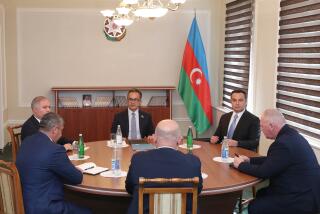A Lone Issue Stalls Afghan Assembly
- Share via
KABUL, Afghanistan — With only one issue unresolved, delegates to Afghanistan’s constitutional convention worked around the clock to save the meeting from collapse.
If there is no agreement today, the convention would have to be declared a failure, said Sibghatullah Mojaddidi, the chairman of the loya jirga, or grand assembly, gathered to ratify the constitution.
“We have only one minor issue left, only one word,” he said without elaborating. “We have reached an agreement on the whole constitution, but we are stuck on one word.”
Delegates, however, said the last obstacle was whether to recognize Uzbek, spoken by a minority of Afghans in the north, as an official language. Gen. Abdul Rashid Dostum was believed to have demanded official status for Uzbek, but others believed it should not have the same status as Pashto and Dari.
United Nations special envoy Lakhdar Brahimi and U.S. Ambassador Zalmay Khalilzad were in emergency meetings all day Saturday with key delegates to save the loya jirga, which has frequently stalled because of feuding between different ethnic groups and military factions.
The historic meeting, which began Dec. 14, was supposed to have lasted no more than 10 days.
On Thursday and Friday, the 500 delegates were scheduled to vote on a number of contentious amendments, including the Uzbek language article and whether Cabinet ministers should have dual citizenship. But the vote was abandoned after a boycott by nearly 200 delegates unhappy with the amendments and, according to some delegates, threats issued by warlords.
Instead, it was decided to resolve the most sensitive articles through consensus-building meetings.
Among the most bitterly disputed amendments was the dual citizenship clause. Northern factions did not want to allow Cabinet ministers to carry two passports, marry foreigners or be non-Muslim. It was finally agreed that ministers would be allowed to have two passports for the next five years. That was a divisive issue because many members of the Cabinet are liberal, Western-educated men such as the finance and interior ministers who are hated by religious extremists.
Many ordinary delegates feel disenfranchised by the closed-door, high-level talks. Haji Farid, a Kapisa province delegate, said many of his colleagues feared the warlords participating in the convention, such as Dostum and Ustad Abdul Rasul Sayyaf.
“Some people, due to internal security problems, if they live within sight of the gunmen, they are too afraid,” Farid said. “If they go home, they will be in danger. A lot of us are not in favor of what Dostum or Sayyaf want, but we are too afraid.”
Afghan President Hamid Karzai also faced a dilemma. For the sake of unity and saving the loya jirga he conceded to the Uzbeks, but at the risk of alienating the Pushtuns, the country’s biggest ethnic group and his key supporters.
The Pushtuns argued that adopting Uzbek as a third language would lead to a weak, federalist state open to meddling by neighboring nations.
“We are afraid because if we accept Uzbek as the third official language, we know Dostum has strong links to foreign countries such as Uzbekistan and this could create closer ties with that country,” said Nazar Mohammed, a Pushtun delegate from the capital, Kabul. “They will want to build schools with only their language. This will create a federalist state and divide Afghanistan. It is a disaster.”
Said delegate Hashmat Ghani Ahmadzai, a key power broker, on the challenge facing Karzai: “In one month if Karzai does not clean up his house, he’ll lose the next election. When you got your [Pushtuns] not happy, who is going to back you? In this country politics means the backing of your tribe, not political parties.”
Khalid Pushtoon, spokesman for the governor of Kandahar, blamed the delays on Dostum. “The Uzbek language being an official one was never mentioned in the draft constitution. This is something completely new. Dostum has no credibility among his people. So he wants to go back and say, ‘See, I did this for you.’ He has always oppressed the people of Afghanistan, killed his own citizens, so now he wants to say that he did something positive.”
Karzai also has conceded some powers to the parliament, which could cause political impasse in the future, a Western diplomat said.
“The presidential system has been watered down,” he said. “The president is now responsible to the people and the lower house. But it is extremely vague because the wording can be interpreted in many ways. Does it mean the parliament can hold a vote of no confidence?
“Individual ministers can also be censured by the lower chamber,” the diplomat added. “But what does it mean? Does it mean ‘we disapprove of what you do,’ or does it mean ‘you have to resign?’ ”
More to Read
Sign up for Essential California
The most important California stories and recommendations in your inbox every morning.
You may occasionally receive promotional content from the Los Angeles Times.










